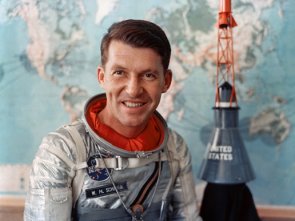I wish I had something profound to say about Wally Schirra. But when I think about him, what I get instead are moments. Great moments. I remember watching Schirra’s Atlas booster muscling Sigma 7 downrange that day in 1962. A space-struck kid, I thought the astronaut was as cool and unflappable as any man who would ever ride a rocket.

His sense of humor was irrepressible, especially in the context of hazardous early space missions. Thus the ‘Jingle Bells’ moment on the harmonica, and his sighting of the ‘UFO’ — Santa Claus and his reindeer. “We have an object, looks like a satellite going from north to south, probably in polar orbit… I see a command module and eight smaller modules in front. The pilot of the command module is wearing a red suit…”
Tom Stafford was in on that gag on Gemini 6 (he would later go on to command Apollo 10). I was in college when Apollo 7 flew and recall the squabbles with controllers on the ground. To be fair, Schirra had a cold, a famous one that he treated with Actifed (he later did TV commercials for the product). But it’s also true that, cold or not, the astronaut had a rough edge; he seemed to yearn for space when on the ground but to dislike it thoroughly once aloft, a deeply human trait that made me admire him the more.
Indeed, Schirra always seemed to me the most likable of the Mercury 7. His straightforward, no-nonsense manner made him ideal as a CBS commentator (usually with Walter Cronkite), bringing the space program to life during the thrilling era of the later Apollo missions. These are great memories, none of them profound, but the realization that he was 84 when he died made me re-think those days that seem so fresh to me still. How does the guy who flew Sigma 7 become 84, when I can still hear the thunder of that booster as it pushed for black sky?


“How does the guy who flew Sigma 7 become 84, when I can still hear the thunder of that booster as it pushed for black sky?”
GOOD WRITING!
Edg
Thank you, Edg! Very kind.
i saw every launch in the mercury series as a space struck kid! hard to believe schirra is dead! then i saw most of the other launches or heard them on the radio.even if i had to carry a small trasistor radio to school. just to put it all in perspective…when i stood in an aisle in sister mary lorrettas classroom to watch alan shephard become the first american in space in 1961 i was 12.god it seems like a loooong time ago in another life!! ps we had no tv in our room and she invited us in,ergo standing in the aisle! thank you all your friend george 12!!! it was all just beginnig and sooo much was in front of us! by 2007 we would have been positive to have mars bases! or so we felt then. ;) g
I enjoyed Schirra’s commentary on tv as a kid. I was not aware (as that same kid) of the near mutiny Schirra and his crew landed themselves in. I think he was a great astronaut and certainly a supremely talented pilot. His Gemini mission was a relative quickie get it up and get back down. And of course, his cool head under pressure on the launchpad in Oct ’65 is legnedary.
I can imagine his testiness during a ten-day orbital flight that actually had very little piloting duties once in orbit. Sadly, his Apollo 7 crewmates were blackballed by NASA. Cunningham and Eisele never flew into space again. Schirra had already slated himself for retirement, so he was pretty immune from consequences.
That’s interesting — I hadn’t realized that Eisele never flew again. Yes, if an astronaut career is on the line, it’s best not to cause too many ripples with ground controllers!
And while Schirra had nothing directly to do with this, he was
chosen by NASA after Carpenter messed up his Aurora 7 mission
by getting caught up in the wonder of being in space. See Frank
White’s Overview Effect for the details.
NASA wanted a no-nonsense guy up there who would follow the
rules to the letter and chose Schirra, even though he was known
for his practical jokes.
Of course NASA needs serious, skilled people flying their
space missions, especially in the early days, but it is a shame
that Carpenter had to pay the price for being human and
reacting to space like a human instead of a robot.
He might have made a great spokesman and connection
between NASA and the public. Instead they basically made
sure Carpenter never flew in space again.